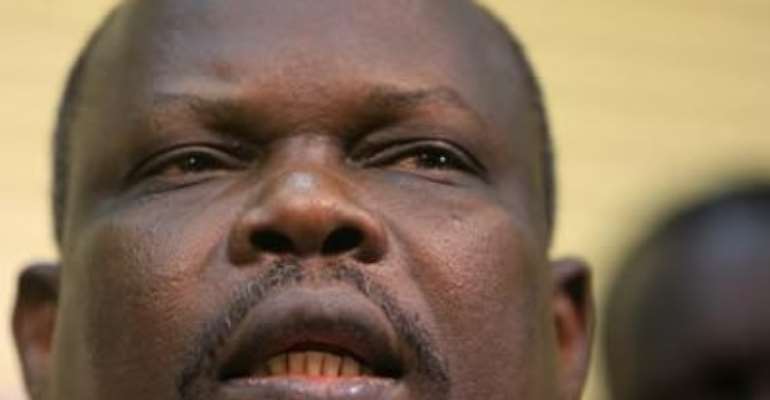South Sudan Calls For UN Sanctions On Khartoum

The United Nations should impose sanctions on Sudan for failing to obey a Security Council resolution calling for an end to hostilities and renewed negotiations with South Sudan over oil and border disputes, South Sudan's negotiator said on Friday.
Pagan Amum told Reuters Khartoum had not complied with the May 2 resolution giving neighbours Sudan and South Sudan, under threat of sanctions, two weeks to resume talks over their differences, which boiled over into border clashes last month.
He said while South Sudan, which became the world's newest independent nation last year, had signalled its readiness to restart talks immediately, its neighbour had carried out air attacks after May 2 and had not moved to resume negotiations.
"They have violated the timeline," Amum, Secretary-General of South Sudan's ruling Sudan People's Liberation Movement (SPLM), said in an interview in the South Sudanese capital Juba.
He urged the U.N. Security Council to "impose sanctions now and take measures against Khartoum".
A spokesman for Sudan's Foreign Ministry said Amum's remarks were "unfortunate" and accused the south of violating the Security Council resolution by continuing its "aggression" in Sudan's territory.
While insisting the South wanted to live in peace with Sudan, Amum criticised both the United Nations and the African Union for failing to deal firmly with Sudan, which he said routinely defied the international community.
"If the U.N. fails to take action, they will be judged by humanity and the people of South Sudan will lose trust and confidence in them," the South Sudanese negotiator said.
"We are going to ask them, 'What are you going to do?'"
He said he had written to former South African President Thabo Mbeki, who is in Khartoum as head of the AU panel tasked with resolving the north-south disputes, asking when the negotiations with Khartoum would restart but had not so far received a response.
El-Obeid Morawah, Sudan's Foreign Ministry spokesman, said: "The Security Council and the AU have their own monitoring mechanisms and it is they who will say which side violates the decisions. I think it is better for them (South Sudan) and for us to put the negotiations first."
On Thursday, the U.N. Security Council demanded that Sudan immediately withdraw troops from the disputed Abyei border region but Khartoum pledged only to do so after a joint military observer body for the area was created.
Amum said South Sudan had withdrawn its police forces from Abyei in compliance with the U.N. demands and said Khartoum's failure to pull out its military was a violation that should be punished by the Security Council.
'FAIR' OIL DEAL
Juba accuses Khartoum of launching bombing raids on South Sudanese territory after May 2. U.N. peacekeepers have verified damage and casualties from at least one raid and the U.N.'s top human rights official said last week she was outraged by "indiscriminate" aerial attacks by Sudan that she said were killing and injuring civilians.
Sudan denies Juba's accusations of air raids and independent verification of rival claims are often difficult because of limited access to remote conflict areas.
Amum chastised the U.N. and the AU for what he said was inaction over repeated Sudanese attacks.
"The U.N. sees it as normal for (Sudanese President Omar Hassan al-) Bashir to bomb and kill the people of South Sudan. The conscience of the international community is not pricked ... they are used to it, it has become normal," he complained.
He said the international community only reacted when South Sudanese forces, in what he called self-defence, occupied the disputed Heglig oil region, as the two armies clashed on their border last month. Under international pressure, South Sudan withdrew from Heglig.
The two Sudans, which fought a civil war for more than two decades before a 2005 peace deal that eventually led to South Sudan's independence, sit on significant oil reserves.
The South's independence gave it about three quarters of the oil output of the previously unified nation. A dispute over the fees South Sudan should pay to Sudan to export its crude through the north prompted Juba to shut off its oil production earlier this year, straining the two economies.
Bashir said this week Khartoum would not allow South Sudan to export any oil through its territory unless the two settle all border security disputes.
Amum said Juba was ready to strike a "fair commercial agreement" with Khartoum on oil transit fees but South Sudan would demand international guarantees for such a deal to prevent Sudan from "stealing or diverting" its oil.
"The U.N. Security Council must be the guarantor," with the involvement of China, India and Malaysia - the three largest investors in the Sudans' now separate oil industries - he said.
"They are interested parties ... they must guarantee that if Sudan takes one single barrel from South Sudan they will pay the value of that barrel," Amum said.
He rejected predictions from some experts that South Sudan would collapse in months without oil revenue after the production shutdown, saying his government was introducing austerity measures and moving to acquire bridging loans and financing from friendly government and willing investors.
Amum said South Sudan had foreign exchange reserves to last "more than a year" and was negotiating "future and forward sales of oil in the ground" to obtain financing.
REUTERS
